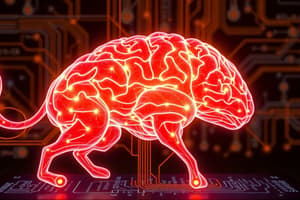Podcast
Questions and Answers
What distinguishes explicit memory from implicit memory?
What distinguishes explicit memory from implicit memory?
- Implicit memory does not rely on previous experiences.
- Explicit memory involves conscious effort to recall. (correct)
- Explicit memory is never affected by aging.
- Implicit memory can only recall events from the past.
Which type of memory includes knowledge about events personally experienced?
Which type of memory includes knowledge about events personally experienced?
- Episodic memory (correct)
- Implicit memory
- Semantic memory
- Procedural memory
How is semantic memory best characterized?
How is semantic memory best characterized?
- It involves recalling specific events with visual imagery.
- It relies heavily on sensory input from the environment.
- It consists mainly of language-based knowledge and facts. (correct)
- It is only concerned with emotional experiences.
What does the term 'declarative memory' refer to?
What does the term 'declarative memory' refer to?
In what aspect of memory do prompts play a significant role?
In what aspect of memory do prompts play a significant role?
Which of the following is a common misconception about explicit and implicit memory?
Which of the following is a common misconception about explicit and implicit memory?
What type of information is likely to be stored as part of episodic memory?
What type of information is likely to be stored as part of episodic memory?
Which of the following statements about memory types is TRUE?
Which of the following statements about memory types is TRUE?
What is egocentric bias in memory?
What is egocentric bias in memory?
What is hindsight bias commonly referred to as?
What is hindsight bias commonly referred to as?
What does the term 'persistence' refer to in memory?
What does the term 'persistence' refer to in memory?
Proactive interference occurs when:
Proactive interference occurs when:
Which of the following best describes retroactive interference?
Which of the following best describes retroactive interference?
What is an example of interference in memory?
What is an example of interference in memory?
How does the reconstructive nature of memory contribute to hindsight bias?
How does the reconstructive nature of memory contribute to hindsight bias?
What distinguishes interference from other memory issues?
What distinguishes interference from other memory issues?
What type of memory involves the personal experience of events?
What type of memory involves the personal experience of events?
Which type of declarative memory includes knowledge of facts and concepts?
Which type of declarative memory includes knowledge of facts and concepts?
What memory type involves skills and actions, such as riding a bicycle?
What memory type involves skills and actions, such as riding a bicycle?
Which type of memory refers to memories we can consciously try to recall?
Which type of memory refers to memories we can consciously try to recall?
What is the term for the involuntary recall of unwanted memories?
What is the term for the involuntary recall of unwanted memories?
Which type of memory error involves confusing the source of information?
Which type of memory error involves confusing the source of information?
What does the term 'short-term memory' refer to?
What does the term 'short-term memory' refer to?
What is the process of organizing information into manageable bits called?
What is the process of organizing information into manageable bits called?
Which memory type is engaged when recalling information without cues?
Which memory type is engaged when recalling information without cues?
Which memory model processes information through sensory, short-term, and long-term memory systems?
Which memory model processes information through sensory, short-term, and long-term memory systems?
What term describes the creation of a permanent record of information in memory?
What term describes the creation of a permanent record of information in memory?
Which term refers to the inability to recall information due to blockage?
Which term refers to the inability to recall information due to blockage?
What are memory aids that help organize information called?
What are memory aids that help organize information called?
What type of memory is characterized by the storage of brief sensory events?
What type of memory is characterized by the storage of brief sensory events?
Flashcards
Memory
Memory
The ability to remember past events and information.
Encoding
Encoding
The process of converting information into a form that can be stored in memory.
Storage
Storage
The process of retaining information over time.
Retrieval
Retrieval
Signup and view all the flashcards
Sensory Memory
Sensory Memory
Signup and view all the flashcards
Short-Term Memory (STM)
Short-Term Memory (STM)
Signup and view all the flashcards
Long-Term Memory (LTM)
Long-Term Memory (LTM)
Signup and view all the flashcards
Rehearsal
Rehearsal
Signup and view all the flashcards
Forgetting
Forgetting
Signup and view all the flashcards
Explicit Memory
Explicit Memory
Signup and view all the flashcards
Procedural Memory
Procedural Memory
Signup and view all the flashcards
Episodic Memory
Episodic Memory
Signup and view all the flashcards
Misattribution
Misattribution
Signup and view all the flashcards
False Memory
False Memory
Signup and view all the flashcards
Semantic Memory
Semantic Memory
Signup and view all the flashcards
Declarative memory
Declarative memory
Signup and view all the flashcards
Prompt
Prompt
Signup and view all the flashcards
Source memory
Source memory
Signup and view all the flashcards
Familiarity
Familiarity
Signup and view all the flashcards
Egocentric Bias
Egocentric Bias
Signup and view all the flashcards
Hindsight Bias
Hindsight Bias
Signup and view all the flashcards
Interference
Interference
Signup and view all the flashcards
Proactive Interference
Proactive Interference
Signup and view all the flashcards
Retroactive Interference
Retroactive Interference
Signup and view all the flashcards
Persistence
Persistence
Signup and view all the flashcards
Study Notes
Memory as an Information Processing System
- Memory is a system for encoding, storing, and retrieving information.
- It's compared to a computer, with encoding as input, storage as retention, and retrieval as output.
Encoding
- Encoding is the input of information into the memory system.
- Sensory information is labelled or coded by the brain.
- Information is organized with similar information and connected to existing concepts.
- This can be automatic (like recalling lunch) or effortful (studying for a test).
Storage
- Storage is the creation of a permanent record of encoded information.
- Information passes through sensory, short-term, and long-term memory.
Retrieval
- Retrieval is the process of accessing stored information.
- Recall, recognition, and relearning are the three main retrieval methods.
Types of Encoding
- Semantic encoding: encoding of meaning of words.
- Visual encoding: encoding of images.
- Acoustic encoding: encoding of sounds, especially words.
Types of Long-Term Memory
- Explicit memory: conscious memories
- Episodic memory: personal experiences
- Semantic memory: facts and general knowledge
- Implicit memory: unconscious memories
- Procedural memory: skills and habits
- Priming: prior exposure affects current response
- Emotional conditioning: associating emotions with stimuli
Factors Affecting Memory
- Decay: memories weakening over time.
- Interference: old memories hindering new ones (proactive) or new ones hindering old ones (retroactive).
- Suggestibility: leading questions or suggestions influencing memories.
- Misinformation effect: inaccurate information altering memories.
- Bias: personal beliefs and attitudes impacting memory.
Memory Errors
- Transience: fade of memories over time.
- Absentmindedness: lapse in attention leading to forgetting.
- Blocking: inability to retrieve stored information.
- Misattribution: confusing the source of a memory.
- Suggestibility: external cues influencing memories.
- Bias: personal beliefs skewing memory recall.
- Persistence: unwanted memories being retained.
- Intrusion: irrelevant thoughts or memories entering the memory.
Memory-Enhancing Strategies
- Rehearsal: conscious repetition of information.
- Chunking: organizing information into meaningful units.
- Elaborative rehearsal: linking new information to existing knowledge.
- Self-reference effect: relating information to oneself.
- Distributed practice: spacing out study sessions.
Memory and the Brain
- Different brain regions (amygdala, hippocampus, cerebellum, prefrontal cortex) play various roles in different types of memory.
- Neurotransmitters (e.g., glutamate, acetylcholine) are involved in memory processes.
Amnesia
- Amnesia: memory loss due to brain injury, disease, or psychological trauma.
- Anterograde amnesia: inability to form new memories after the injury.
- Retrograde amnesia: inability to recall memories prior to the injury.
Everyday Connections
- Autobiographical memory: personal recollections.
- Identifying retrieval cues for everyday tasks.
Studying That Suits You
Use AI to generate personalized quizzes and flashcards to suit your learning preferences.
Related Documents
Description
This quiz explores the fundamentals of memory as an information processing system. It covers key concepts like encoding, storage, and retrieval, comparing memory to computer operations. Test your knowledge on different types of encoding and the processes involved in storing and accessing information.




